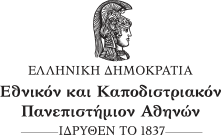UNDERGRADUATE STUDIES
626. FOOD CHEMISTRY (Compulsory / Course Hours: 4 / Laboratory Hours: 0 / Credit Units: 6 )
Course website: eclass.uoa.gr/courses/CHEM150/
Course content: Science, Food Chemistry in general, Food in general, Water, Carbohydrates, Proteins, Enzymes, Fats and Oils and other lipids, Vitamins, Minerals. Desirable and undesirable food ingredients, Chemical additives, Colorings, Taste and Smell. Foods of plant and animal origin, Stimulants, Digestion, Food poisoning, New foods.
Study Material: 1) "Food Chemistry" G. Zambetakis, Ch. Proestos, P. Markaki. Stamouli Publications, Athens, 2014, 2) Lecturer's notes.
7219. FOOD QUALITY AND SAFETY CONTROL ( Elective / Course Hours: 3 / Lab Hours: 6 / Credits: 9 )
Course website: eclass.uoa.gr/courses/CHEM101/
Prerequisite courses: (1) Analytical Chemistry (213). (2) Food Chemistry (626).
Course content: Food analysis methods, Principles of quality control, Specifications, Legislation, Sampling, HACCP, Microscopic food inspection.
Lab Exc. Content: Analysis of milk, flour, honey, oil, cheese, juice. Determination of aromatic compounds by GC and HPLC. Organoleptic properties of juice and yogurt. Spectrophotometric determination of total phenolics in wine. Determination of antioxidants in food.
Study Material: 1) Ch. Proestos P. Markaki "Food: Quality control, safety and microbiology." 2017, Da Vinci Publications, 2) Lecturer's Notes for the Lab.
7220. FOOD MICROBIOLOGY ( Elective / Lecture Hours: 3 / Laboratory Hours: 6 / Credit Units: 9 )
Course website: eclass.uoa.gr/courses/CHEM134/
Prerequisite course: Food Chemistry (626). Due to the limited number of laboratory places (35), if the number of students enrolled in the course exceeds this number, the number of secured credits will be taken into account for the selection.
Course content: Classification of microorganisms, factors favoring their growth, stains, cultures of microorganisms, microorganisms and fermentations, spoilage.
Content erg. exercises: Microbiological control of milk. Water microbiology. Staining of Microorganisms. Observation of microorganisms under the microscope. Microbial fermentations. Detection and characterization of microorganisms in food. Mycological control of food.
Grading: Single exam. Average grade from successful exams in theory and laboratory exercises.
Study Material: 1) Ch. Proestos P. Markaki "Food: Quality control, safety and microbiology." 2017, Da Vinci Publications, 2) FOOD MICROBIOLOGY, Eudoxus: 94690299Puclication: 1/2020 Authors: KARL R. MATTHEWS, KALMIA E. KNIEL, THOMAS J. MONTVILLE ISBN: 978-618-202-004-3 Disigma Publications 3)Lecturer's notes for the course, 4) Lecturer's notes for the lab.
8218. FOOD TECHNOLOGY ( Elective / Lecture Hours: 2 / Lab Hours: 3 / Credits: 5)
Course website: eclass.uoa.gr/courses/CHEM115/
Prerequisite courses: Numerical Methods and Programming(CHEM142)
Course content: Food industries. Food preservation methods. Food packaging. Food hygiene. Biotechnology elements.
Lab Exc. Content: Biotechnology exercises.
11840 An Introduction to Mathematical Techniques in Food Science (elective course/Lecture hours:2/ Lab hours: 0/ECTS:3)
Course website: https://eclass.uoa.gr/courses/CHEM330/
Prerequisite courses:
Learning Outcomes:
1. Knowledge & Understanding:
By the end of the study-unit the student will be able to:
- Demonstrate an understanding of the calculus in Food Science; and
- Identify the appropriate mathematical technique to solve specific problems.
2. Skills:
By the end of the study-unit the student will be able to:
- Analyse and evaluate data that is relevant to Food Safety and Food Preservation; and
- Report results of their calculations in a clear, structured and concise form.
Main Text/s and any supplementary readings:
Main Text: 1)John A. Bower, WILEY Blackwell. Statistical Methods for Food Science: Introductory Procedures for the Food Practitioner (2013).
Supplementary Readings: 2)Food Science and Technology. Edt. Geoffrey Campbell-Platt (Wilet-Blackwell), 2009. 2) Bioprocess Engineering Principles by Pauline M Doran, ISBN: 978-0-12-220855-3, 1995. 3)Richard W Hartel, D. B. Hyslop, Robin K. Connelly, Jr. T. A. Howell. Math Concepts for Food Engineering (second edition), RC Press Inc (2008). ISBN:1420055054.
Study Material: 1) "Food Technology" Nasopoulou, K., Nikolaou, S. and Zambetakis I., Stamouli Publishing House, Athens, 2010.
